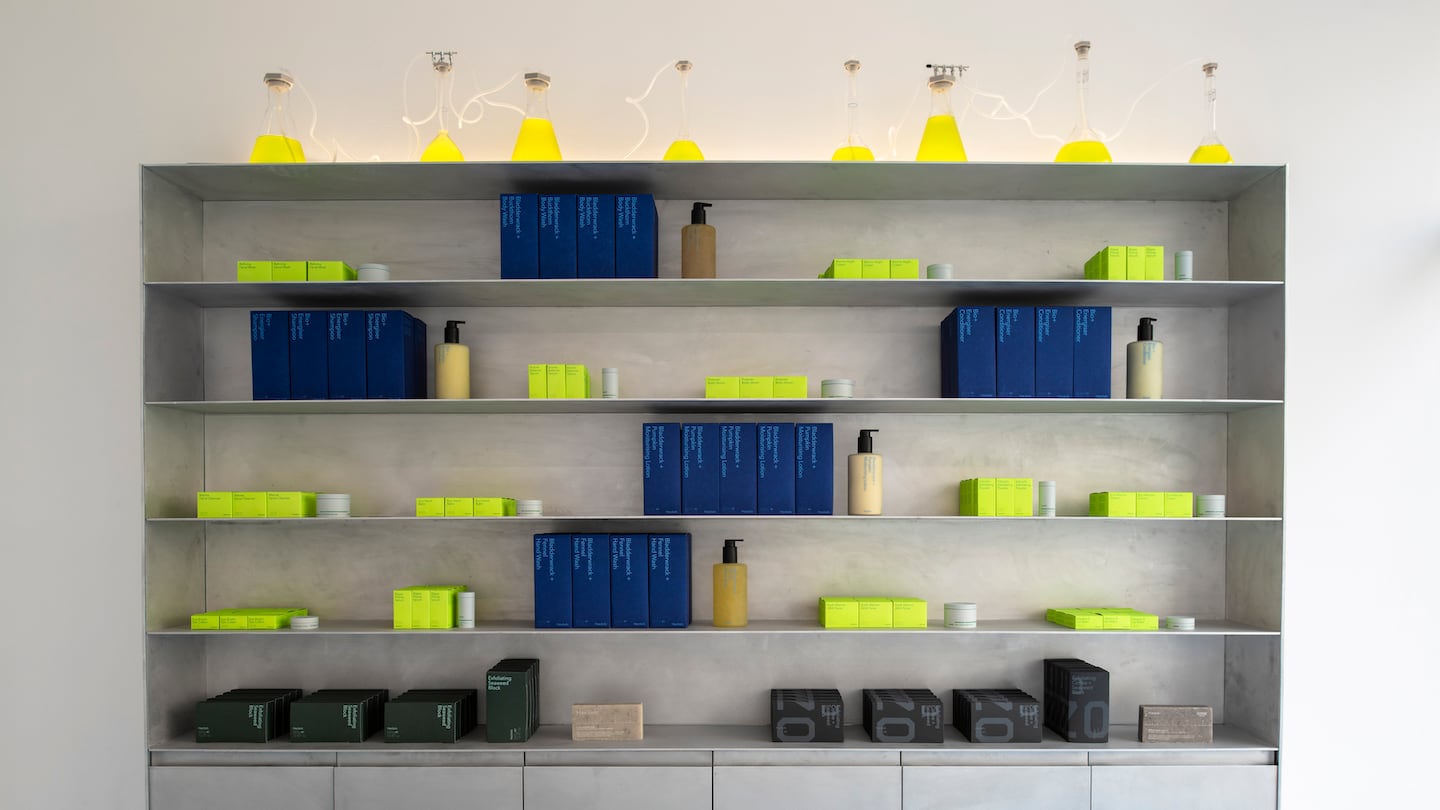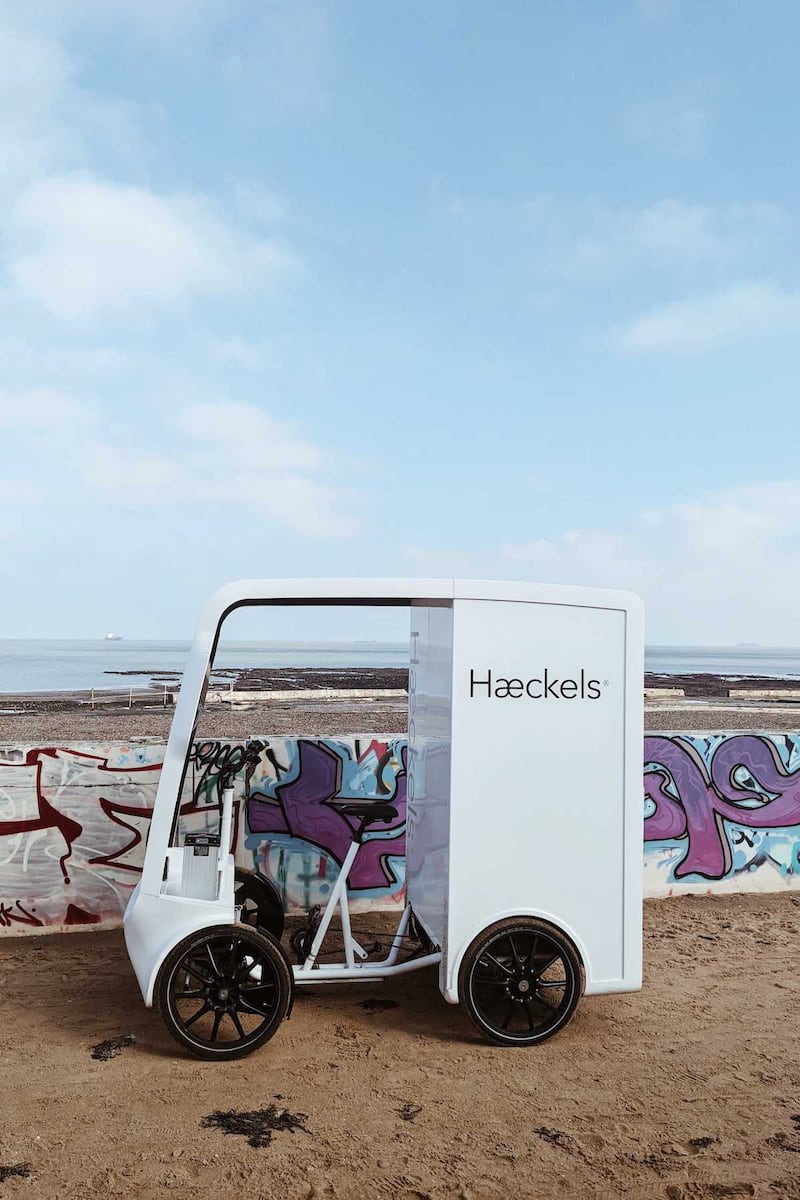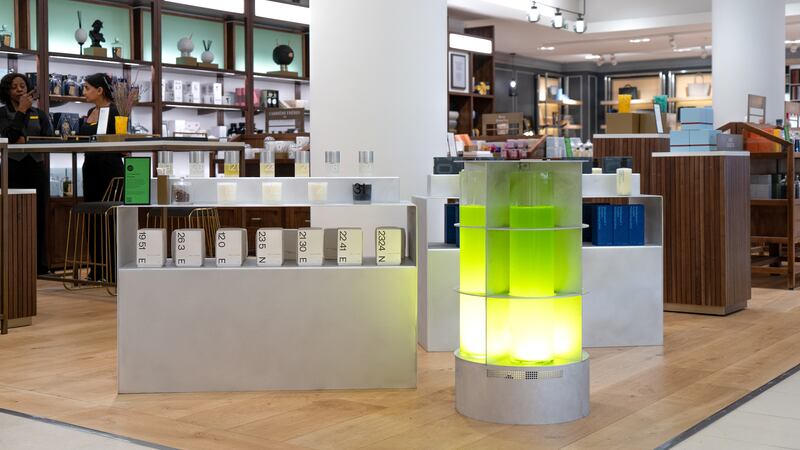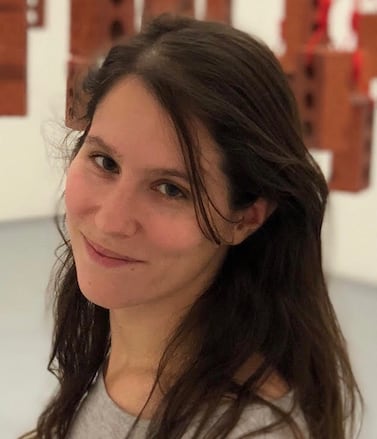
The Business of Fashion
Agenda-setting intelligence, analysis and advice for the global fashion community.

Agenda-setting intelligence, analysis and advice for the global fashion community.

It started with goo.
Cult British beauty brand Haeckels had forgotten a batch of store-grown spirulina for months and it had fermented into a green gloop. Naturally, founder Dom Bridges and managing director Charlie Vickery stuck their fingers straight in the slime and smeared it on their faces.
The results were “incredible,” Vickery said, sipping a vegan collagen seaweed broth (nicer than it sounds) in a corner of Haeckels’ headquarters, a converted casino in the British seaside town of Margate.
The goo was turned over to the brand’s head of formulation, Em Rose, who applied a more scientific lens to the spirulina. The result is Spiraglow, a blend of three seaweed extracts designed to feed facial bacteria and promote a healthy microbiome, according to Haeckels.
ADVERTISEMENT
It’s the kind of scrappy approach that has made Haeckels, known for its responsible business practices and products made from locally-sourced natural ingredients and waste, a somewhat unlikely beauty breakthrough. The British brand has garnered a small, but devoted customer base and an investment from the Estée Lauder Companies’ venture arm last year.
Spiraglow is the first hero ingredient of Haeckels Lab, a research and development arm focused on developing lab (or store)-grown ingredients that officially launches with a toner, cleansing milk and serum on Wednesday. The move is intended to position the brand for growth, opening opportunities to develop prestige products, new formulations and ingredients. It also plays into a hot debate about what a responsible beauty brand should look like.
“The Lab launch is probably the most disruptive thing we’ve done,” said Vickery. “The green army will cancel you for anything that’s not natural… but there is greenwashing behind natural ingredients.”
Haeckels has never really played by the rules.
The company was founded in 2012 after Bridges, a former advertising executive, moved to Margate and started volunteering as a beach warden, experimenting with making soap from seaweed in his down time.
Unlike most beauty brands, it’s vertically integrated, making all its products in purpose-built labs in the Margate casino. Its paid marketing spend is about £5,000 ($6,000) a month, a stark contrast to the influencer-heavy growth strategies of many competitors. Haeckels’ 51,000 Instagram followers are as likely to get a lengthy post explaining the benefits of compostable packaging as they are a guide to Haeckels’ four-step skincare regime.
At the brand’s Margate flagship – perched on a cliff over the road from the casino – moss grows under the floor (to purify the air) and ingredients grow in hydroponic towers. Bioreactor flasks of neon-green liquid spirulina bubble next to minimalist pots of moisturiser and frosted glass bottles of perfume.
Employees whizz down to the beach twice a week on Eav – an e-bike fitted with a person-sized storage unit – to harvest seaweed used to make face creams and soaps sold in Selfridges, Liberty and Dover Street Market.
ADVERTISEMENT

When Estée Lauder invested last year the brand was at an inflection point. The pandemic’s wellness boom had driven sales to record levels, but behind the scenes the company was struggling to keep up. Products were constantly sold out and cash flow was a challenge.
ELC was a late entrant to the fundraising process, sliding into Vickery’s DMs on LinkedIn when negotiations with other potential investors were already fairly advanced. But the American beauty group offered something no one else had: freedom.
“Everyone else was like, ‘you need to consolidate, outsource manufacturing,’” said Vickery. “They were really interested in having the brand, but losing the DNA of everything we stand for.”
In contrast, Haeckels’ unconventional business model was a selling point for Estée Lauder. Its venture arm was set up to make early-stage investments in disruptive brands that could fill gaps in the company’s portfolio as well as create future opportunities for growth.
Haeckels has “really been built on pushing the industry forward,” said Shana Randhava, senior vice president of the Estée Lauder Companies’ New Incubation Ventures. It’s “laser focused on discovering and pioneering new materials and pushing boundaries on where it can take sustainability.”
The investment (for an undisclosed sum) helped scale up Haeckels’ manufacturing capabilities and reposition the brand for growth, with more design-led packaging and a focus on the science behind its products.
Last year, the brand generated almost £5 million in revenue, a little shy of double what it made in 2021 with the UK remaining its core market. The company should be profitable by April and expects to double its sales this year, according to Vickery.
Haeckels Lab is central to the company’s growth strategy. Priced in the £40 to £70 range, its products will be more expensive than the brand’s core selection of £18 to £40 skincare, designed to help move the brand to profitability and into a more elevated market.
ADVERTISEMENT
But the push is also intended to keep Haeckels at the forefront of an increasingly spicy conversation about the nature of sustainable and responsible beauty products.
While booming consumer interest is expected to propel the market for natural and organic cosmetics and personal care to $50.5 billion by 2027, according to Coresight Research, there’s also a growing backlash against fuzzy and misleading claims. Natural, according to Haeckels, should be counted among them.
Though the company has built its business around local and nature-based ingredients, there’s no way for it to scale that responsibly, said Vickery. Growing natural ingredients can be very resource intensive and Haeckels is nearing the limit of the seaweed it can harvest in Margate without impacting the local ecosystem. The brand is pitching its lab-cultivated ingredients as a lower impact alternative that will allow it to scale responsibly and maintain a balanced use of natural products.
“There’s a huge opportunity in this area of lab-grown and biotech beauty,” said Randhava. “Haeckels [is] looking to offer their consumer and the industry as a whole new solutions that are clean, safe, sustainable and still efficacious.”
The vision is for Haeckels to grow ingredients in its London and Margate stores and through installations in wholesale retail spaces, giving shoppers a visual link to where their skincare came from.
The company is looking to open a new London flagship this year where customers could buy face creams and enjoy treatments using products made from ingredients grown in basement bioreactors.

It’s also quietly working to bulk up the material science arm of its business with a different kind of lab-grown product: packaging. The brand spent years hunting for good-looking, high performance skincare packaging that doesn’t create waste at the end of its life. That’s still a work in progress, but that R&D led Haeckels to develop plastic-like seaweed sheets that could be used as an alternative to plastic wrap. The brand has soft orders in place with a number of undisclosed companies and is looking into additional funding options to scale production.
If all goes according to plan, Haeckels will look to expand stateside in the next 12 to 18 months – three years late.
When Haeckels initially took on funding from Estée Lauder, the plan was to use the money to launch in LA, substituting local Margate ingredients for Californian ones. But the brand wasn’t ready. Instead, it took a slower approach taking the time to hone its localised supply chain and balance it with its new lab-grown capabilities.
Going trans-Atlantic will be a real test of whether it’s a brand model that can scale.
The conglomerate’s minority investment in UK-based beauty brand Haeckels speaks to a beauty acquisition space that prioritises earlier-stage companies and greater autonomy for brands.
‘Clean’ products have been a driving force in beauty for years. But with no universal standards, the confusion surrounding that label is threatening both its use as a measure of product safety and in marketing.
The fashion and beauty industries will benefit from a biological revolution that could transform value chains, change society and potentially mitigate pressure on the environment. As scientific breakthroughs unfold, we expect more partnerships between large brands and start-ups, deeper research, and increasing commercialisation of these ground-breaking innovations.

Sarah Kent is Chief Sustainability Correspondent at The Business of Fashion. She is based in London and drives BoF's coverage of critical environmental and labour issues.
Going public is usually a pivotal moment in a company’s history, cementing its heavyweight status and setting it up for expansion. In L’Occitane’s case, delisting might be a bigger conduit for growth.
Brands say they’re barreling ahead with marketing and commerce on the app, even as the clock starts ticking for owner ByteDance to sell it or shut it down.
The Spanish beauty and fashion conglomerate’s smart acquisitions and diverse portfolio could be a big draw for investors. Plus, Adidas is set to confirm its stellar first quarter.
How not to look tired? Make money.